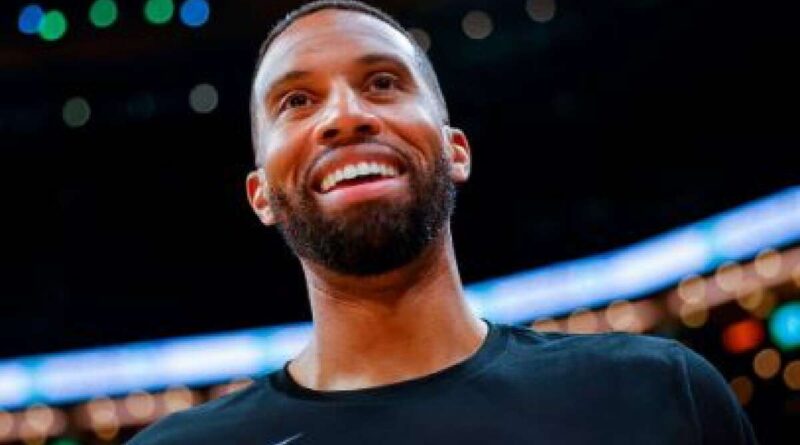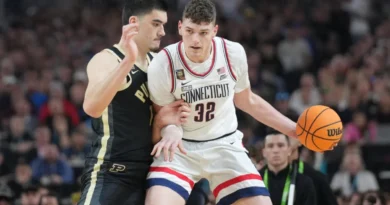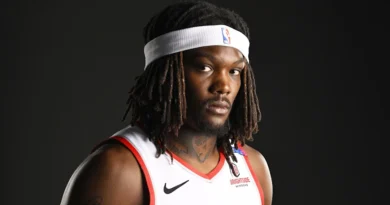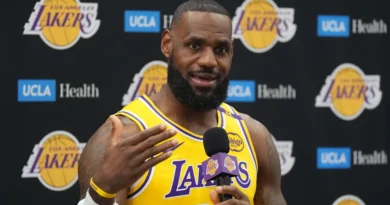Most expected top three players that the Charlotte Hornets could select at No. 6
Though the majority of analysts are not impressed with this year’s draft class overall, there are still guys that could help the Hornets regain their respectability.
The Charlotte Hornets are the subject of another lottery pick; stop me if you’ve heard this one before. This past season was the team’s poorest mark since they were still known as the Bobcats, but even for a franchise that has struggled as hard as the Hornets have in the past ten years, that’s what a 21-61 record will get you.
The Hornets were not helped by the lottery; despite having the third-worst record in the league, the Hawks, Rockets, and Spurs were able to draft ahead of them due to unfortunate ping pong balls. Charlotte will now come in sixth, which is not as horrible as it sounds. Unlike last year, when Victor Wembanyama loomed large over the draft both literally and symbolically, there isn’t an actual extraterrestrial, much less a surefire All-Star, at the top of this year’s prospect pool.
Charlotte may benefit from this since many of the players the Hornets may try to acquire may still be available at number six. French athletes Alex Sarr and Zaccharie Risacher are typically ranked in the top two of mock drafts right now, but Charlotte has never selected an overseas player with its first pick, so Jeff Peterson, the team’s new president of basketball operations, is probably cool with that. Whether or not it has worked out for them in the past—spoiler alert: it hasn’t—the Hornets have a history of selecting American college players, primarily from blue-blooded universities. These are the players who will be available at the sixth pick.
The NBA draft is less than a month away, and the draft combine ended yesterday. Let’s examine the top three choices available to the Hornets during game time
1. Reed Sheppard, Kentucky
One of the most unexpected success stories in college basketball this past season was Reed Sheppard. Despite just making five starts, the rookie’s ability to swipe the ball and score efficiently earned him a spot on the All-SEC Second Team.
Sheppard was a player whose play varied greatly from game to game, but much of that can be attributed to the now-former Wildcats coach John Calipari, who inexplicably refused to start Sheppard, Rob Dillingham, and Antonio Reeves together.
Sheppard would be a great third scoring option next to LaMelo Ball and Brandon Miller because he doesn’t always need the ball in his hands to be productive. Especially with someone like Ball who can drive and kick so well, he hit over 50% from three this past season, which is the most crucial talent in the NBA today. By keeping Miller on the court, teams would be less likely to focus too much on him on the perimeter, allowing the All-Rookie First Team pick to develop into a possible future star.
PJ Washington, Shai Gilgeous-Alexander, and Malik Monk were all taken by Charlotte in successive years from 2017 to 2019, giving them a wealth of experience selecting players from Kentucky in the draft. Sadly for the Hornets, all three of them succeeded in the NBA after they left town (SGA was traded for Miles Bridges and picks on draft night, and he never played for the Hornets). The Hornets’ primary challenge in selecting Sheppard in the draft seems to be keeping him from leaving before he achieves his full potential.
2. Stephon Castle, UConn
In the unlikely event that Donovan Clingan drops to 6, the Hornets would likely pull a hamstring trying to make it to the podium with their pick. Although the UConn center is exactly what Charlotte needs to shore up its pitiful defense, it appears that the big man from the Huskies will be gone by the time Adam Silver puts the Hornets on the clock.
Alternatively, Charlotte can consider looking to Clingan’s teammate for an alternative defensive boost. Despite being a freshman the previous season, Stephon Castle’s style of play and his acceptance of the pressure to defend the national title the Huskies had won before he arrived on campus gave the impression that he was much more experienced.
Castle is a tenacious 6’6″ on-ball defender. He fits perfectly next to LaMelo Ball—defense is, how should I put this politely—just for that reason alone. Not required? Castle was instrumental in keeping Purdue so one-dimensional in the national championship game by limiting the Boilermakers backcourt trio of Braden Smith, Fletcher Loyer, and Lance Jones to 17 points on 6-19 shooting. In the Elite Eight, Castle shut down Illinois star Terrence Shannon Jr., holding the All-American to eight points on 2-12 shooting.
Although there are concerns over Castle’s offensive style, he still has a lot of development left in him as a 19-year-old. Furthermore, with Cam Spencer and Tristen Newton hogging touches, he wasn’t expected to carry any kind of scoring load at UConn. But when it mattered most, he proved he could shoot the ball through the basket, especially in the most difficult test UConn had to face during the tournament—an 86-72 victory over Alabama in the Final Four that was much closer than the score suggested. Castle scored a season-high 21 points to lead the Huskies in that game, and he added 15 more in the national championship game.
3. Dalton Knecht, Tennessee
Midway through the season, the Hornets traded failed free agent signing Gordon Hayward to the Thunder, and Knecht could replace many of the voids left by Hayward, but without the risk of injury from glancing glances.
As the most skilled scorer available, Knecht nearly single-handedly defeated eventual national runner-up Purdue in the NCAA Tournament with his pure skill. Against the Boilermakers, Knecht scored 37 of the Volunteers’ 66 points, and that was no exception. The former Northern Colorado transfer reserved his finest performances for the biggest games of the season, scoring 37 points against UNC in the Dean Dome, 39 points against Auburn at home, and 40 points against Kentucky at home.
The Hornets, who were second-to-last in the NBA in defensive efficiency and third-to-last in offensive efficiency, clearly need assistance in many areas. LaMelo Ball’s comeback from an ankle injury that kept him out of 60 games this season would surely boost those offensive stats, but the Hornets still need more points to even come close to league average, even with their $204 million point guard.
Though his record on defense isn’t great, Knecht is a skilled scorer. Despite being at the top of every opponent’s scouting report, he hit just under 40% from three last season. However, he is more than simply an outside shooter, as he consistently demonstrated throughout the season his ability to get his own shot, whether it be from the midrange or by driving to the basket. Putting him next to Ball and Brandon Miller at shooting guard would increase the risk of Charlotte’s offense more than it has in a long time.




